Charles Leclerc's Belgian GP win: 'Success comes with a darker side'
- Published
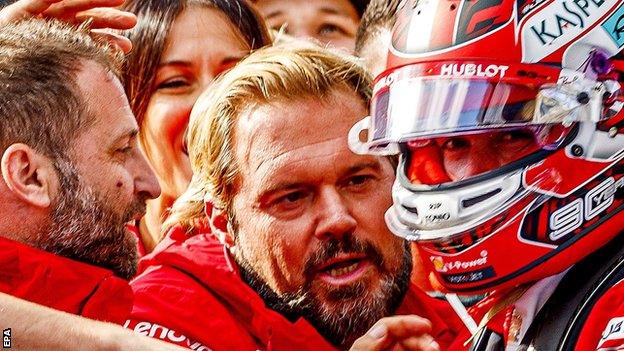
Charles Leclerc demonstrated on Sunday - on the way to his long overdue maiden Formula 1 victory - the strength of character and psychological toughness that is an indispensable part of the make-up of a grand prix driver.
The 21-year-old took a win - at the Belgian Grand Prix under intense pressure from Lewis Hamilton - that should have come many months before against the backdrop of the death of a man he has known and raced against for much of his young life.
When Leclerc took part in his first ever motor race, one of his rivals was Anthoine Hubert, who was killed in an accident of horrific violence in Saturday's Formula 2 race at the daunting Spa-Francorchamps circuit.
Leclerc said - of himself, Toro Rosso driver Pierre Gasly and Mercedes reserve Esteban Ocon - "we were four kids dreaming of F1 and we have grown up together. To lose him was a very big shock for me and everyone in motorsport and a very sad day".
Inevitably, it took the shine off what should have been one of the happiest days of Leclerc's life. To say the least.
"It is very difficult to enjoy this first win with the situation we had yesterday. Overall it means just a dream come true. Since a child, I have been looking up to F1, dreaming of being first a Formula 1 driver, which happened last year and then driving for Ferrari this year and the first win today.
"It is a good day but on the other hand losing Anthoine yesterday brings me back to 2005, my first French (karting) championship was him. It is very difficult to enjoy it fully today but hopefully in two or three weeks I will realise what happened today."
How do the drivers do it?
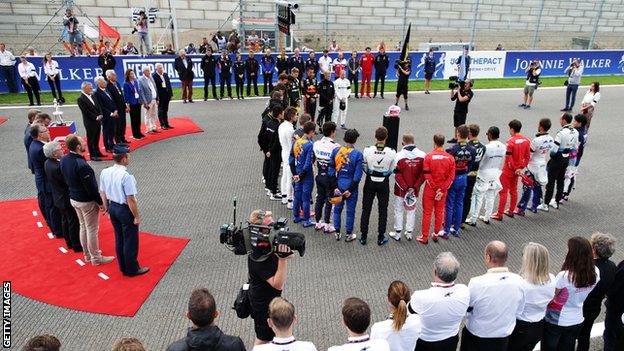
A minute's silence for Anthoine Hubert was observed on the starting grid before the race
Dealing with these sorts of events is part of the job description for a racing driver, as explained in my article on Saturday. But that does not make it easy or trivial.
For Leclerc, it is not the first time he has suffered a loss of someone close to him in his career. As is well documented, he was the godson of the former F1 driver Jules Bianchi, who suffered fatal head injuries in an accident at the Japanese Grand Prix nearly five years ago.
Leclerc has described many times how the death of Bianchi - who, at just eight years older than him, was more like a big brother, and who had been instrumental in guiding him through his formative years in the sport - simply made him more determined to succeed.
But it is one thing to say that, and quite another to actually go out and do it, and risk your own life in the same activity that killed someone so close.
On Sunday, after the race, Leclerc, Hamilton and Valtteri Bottas offered some insight into how they do that.
"For everyone, I guess, but for me it was the first situation like that where we lose someone on a track where you need to race the day after," Leclerc said. "It is obviously quite challenging to close the visor and go through this exact same corner at the same speed you did before, but that is what you have to do in the end."
Hamilton said: "You compartmentalise it, move forwards, get in and do your job. From a racer's and an athlete's point of view, you switch into a zone, and it is quite easy to switch into that zone."
"When you go to the zone," Bottas added. "There are no distractions."
Their answers were short and subdued, and delivered uncomfortably, understandably in the circumstances. Perhaps it pays not to have to talk about it too much, especially when the wounds are so raw, the emotions so tangled and conflicted.
On Saturday, Hamilton had posted an eloquent message on social media, underlining the ever-present dangers of his profession, and how it can never be safe. After the race, his team boss Toto Wolff explained the background to the world champion's decision to do that.
"It is very difficult to relate to what is happening in a car if you have never driven a race car at these speeds," Wolff said.
"Whether it is in junior formulae, all the way to F1, in GT cars, or prototypes, it is still a gladiators' sport. It is still about courage, ability, risk-taking. But through a camera lens you will never realise what it feels like.
"We were fortunate enough for many years to not have these kinds of accidents and maybe forgotten how dangerous the sport is. And this is what Lewis wanted to express. I can totally relate to it.
"If you drive towards Eau Rouge with 260-270km/h, which looks like a 90-degree corner and you take it flat, it is beyond understanding that these guys do what they do and it can end fatally, like it did yesterday."
Could Mercedes have won?
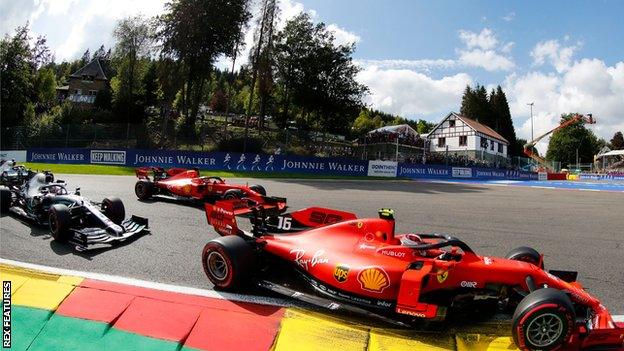
The Ferraris of Vettel (centre) and Leclerc (front) were chased down by Hamilton's Mercedes
Leclerc would certainly not have chosen such circumstances for his first win, and he could probably have done with an easier race, for this was a victory hard won, against the toughest opposition there is.
Ferrari had dominated qualifying, their prodigious straight-line speed easily making up for their relative weakness compared to Mercedes in the corners of Spa's middle sector.
But their greater tyre wear was always likely to make things difficult in the race, and, as expected, Hamilton mounted an assault on the red cars that very nearly came off.
As Leclerc built a small lead over team-mate Sebastian Vettel in the first 10 laps, Hamilton remorselessly turned up the pressure on the German, who was struggling with his pace and his tyres.
Hamilton's proximity forced Ferrari into pitting Vettel earlier than they might have wanted, and from that moment his race was doomed, given Ferrari's tyre management.
It gave Vettel the on-track lead when Leclerc and Hamilton pitted a few laps later, and briefly Leclerc wondered if - yet again - a win would slip through his fingers, after previous disappointments in Bahrain, Azerbaijan and Austria.
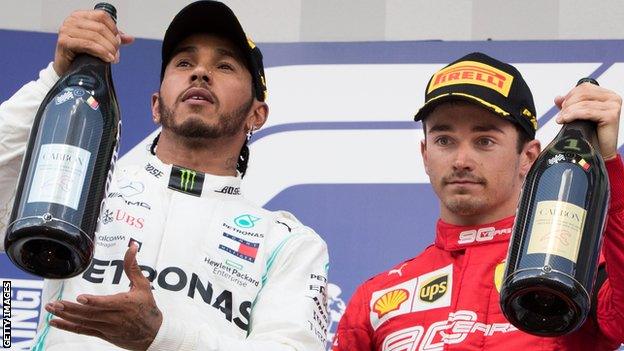
Hamilton is now on 268 points at the top of the drivers' championship
But it soon became apparent that Vettel was in no fit state to hold him off. As Leclerc closed in at close to a second a lap, Ferrari ordered him to let his team-mate go.
Still, though, Vettel was able to have a hand in his team-mate's win. He managed to hold Hamilton off for four laps, giving Leclerc a chance to build a small advantage over the Mercedes, which it soon became clear he needed.
Had either Vettel not held Hamilton back for as long as he did, or had Mercedes pitted Hamilton a lap earlier, on the same lap as Leclerc, the world champion might have won the race, given he ended it on Leclerc's tail. But the Monegasque did just enough.
"If you would have given me a second and third in Spa," Mercedes team boss Wolff said, "I would have taken it before the race because we know that our package compared to the Ferraris with the straight-line speed is inferior.
"Having said that, if we had really optimised our race, which you can only do post-race by being super-intelligent and saying what could have been, maybe we could have pitted one or two laps earlier. Maybe the pit stop could have been a little bit quicker and we would have been in his gearbox for the last two laps.
"But there are so many ifs that I am satisfied with second and third."
A long time coming
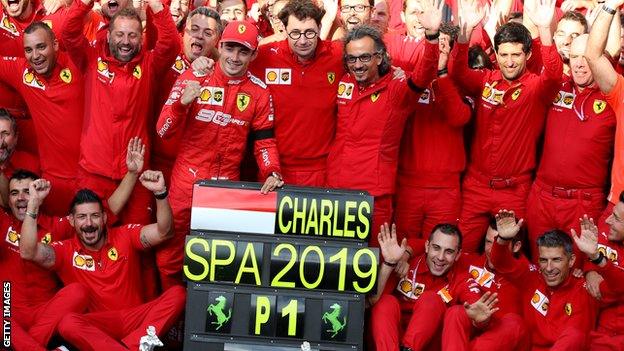
Leclerc's victory in Spa was Ferrari's first win since Raikkonen won the United States GP last year
Traditionally, a first win is the moment that an F1 driver really announces themselves as a true contender in F1. For Leclerc, though, it's different. That came long ago.
It has been clear for some time that this was a man who was likely to become a major part of F1 over the next decade. His debut season for Sauber last year was outstanding, and although he has made a few too many mistakes, and his ability is clearly still raw in certain aspects, his second in the white-heat pressure of Ferrari has been no less so.
Many suspected that he would give Vettel a serious run for his money this year and so it has proved.
Leclerc has now out-qualified the four-time champion for the last six races in a row. Over the season so far, he is faster than Vettel over one lap on average by 0.13secs. He has three pole positions to Vettel's one, and now he has become the first Ferrari driver to win a race.
Admittedly, Vettel should have won in Canada, but for his error and subsequent controversial penalty, but had his season gone slightly differently this could have been Leclerc's third or even fourth victory.
He is slowly but surely establishing himself as Ferrari's lead driver, a situation that is extremely uncomfortable for Vettel, given his statistical success and general status in the sport. And Vettel now faces a very serious task sustaining his standing.
As the season has progressed, the respect between Hamilton and Leclerc has been clear. Leclerc clearly admires Hamilton for his ability and his success. And Hamilton, who has treated the younger man with warmth, has not troubled to hide his regard for Leclerc's talent and potential.
"His results speak for themselves, really," Hamilton said. "It's not easy for any driver to jump into a top team, let alone Ferrari, against a four-time world champion, God knows how much more experience. Then to continuously from race one, out-perform, out-qualify and out-drive a four-time world champion is not easy to do.
"He's been really unlucky in quite a few races this year. Could easily have been the third win today. So, there's a lot more greatness to come from him and I'm looking forward to seeing his growth and racing alongside him. It was fun today, trying to chase him. He was just a little bit too quick."
